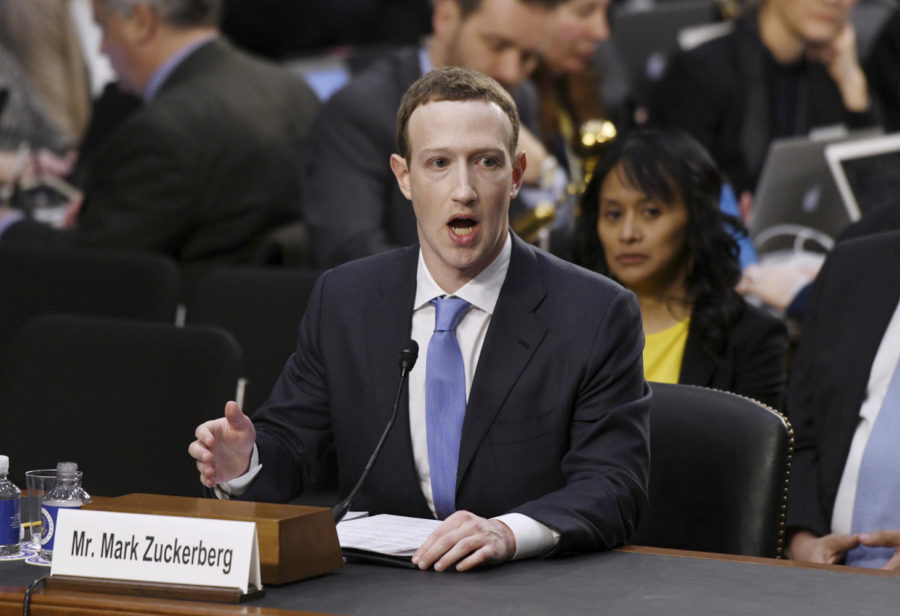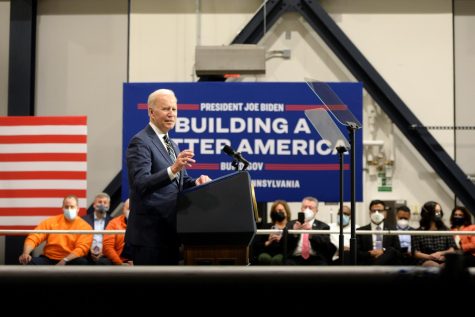Facebook hearing puts double standard on display
Facebook CEO Mark Zuckerberg testifies before the Senate judiciary and commerce committees on Capitol Hill over social media data breach April 10 in Washington, D.C. (Olivier Douliery/Abaca Press/TNS)
April 19, 2018
With more than 2.2 billion users, Facebook is the largest social media platform on the planet. So when news surfaced last month that Facebook was involved in a serious privacy scandal, people were understandably outraged.
As many as 87 million people were affected by a significant breach in user privacy. But what was even more worrisome than the breach itself was the context in which it happened — and the response to it.
Facebook users in late 2013 likely paid little notice to an innocent-looking personality quiz appearing on their feeds. A company called Global Science Research conducted the quiz using a loophole in Facebook’s terms of service that allowed it to secretly — but legally — collect information about profiles on the site. The company then sold the information to companies like voter data firm Cambridge Analytica for profit.
Although only a few hundred thousand people completed the quiz, the company was able to retrieve information from several million users by collecting information on each user’s registered friends. This included biographical details, photos and everything that friends had liked and shared.
Since this revelation, Cambridge Analytica has received heavy criticism for its use of this information to place user-specific ads in favor of President Trump during the 2016 election. Some called this a manipulation of the election. Mainstream media outlets took the opportunity to criticize the company, with CNN writers calling the data harvesting “seemingly unethical” in a March 21 news story.
But many seem to forget when President Barack Obama used virtually the same tactics as GSR did during the 2012 presidential campaign and was met with far less concern about Americans’ privacy. Whether it’s conservative or liberal politicians harvesting, it is important to note that the nonconsensual use of private information is horrific. Criticizing one politician for using these tactics and praising another sends mixed messages as to whether these practices are acceptable — when it should be obvious such violations of privacy are never warranted.
Micah Sifry, a CNN writer and editor for The Nation, pointed out a similar tactic used by Obama’s reelection campaign in an October 2011 story. For Sifry, the Democratic campaign’s mass data collection over an app on social media — whether voluntary or involuntary — was at the forefront of progress. And although Sifry says users are giving out their and their friends’ biographical information, he still goes on to praise the app.
“So far in the presidential election of 2012, there is only one campaign that is doing cutting-edge work with data,” he said.
CNN is only one of many media outlets to display this hypocrisy. For example, the Guardian, one of Cambridge Analytica’s biggest criticizers, published articles about Obama’s data harvesting tactics. While the Guardian reported that the app’s users were sharing information stored publicly on their profiles “consciously or otherwise,” it praised the data as “groundbreaking work” and the “Holy Grail of political campaigners.”
Those disgruntled by the leakage of their information to influential political groups might want to completely disconnect from the platform. But in the aftermath of a Senate hearing last week with Facebook founder and CEO Mark Zuckerberg, the possibility still might not seem all that realistic.
A group of 44 senators rightly grilled Zuckerberg on the Cambridge Analytica scandal. While most, like Senator Dick Durbin, D-Ill., asked how Zuckerberg would improve on securing users’ privacy, Senator Ted Cruz, R-Texas, accused the the Facebook CEO of perpetuating a left-wing bias in the supposedly politically neutral public forum — citing reports that Facebook blocked or suspended several right-wing pages.
While evidence that Facebook is unilaterally biased against conservatives remains inconclusive, it seems likely that many of the people responsible for managing Facebook’s interface are determined to stifle right-wing content. In a May 2016 interview with Gizmodo, several Facebook employees admitted to preventing stories about Republican candidate Rand Paul and the conservative conference CPAC from entering the site’s “trending” section.
It’s not yet clear if Facebook will update its terms and conditions to fix the loophole that allowed GSR to access users’ information. It would be foolish to expect change to occur now, judging from the sheer number of past data breaches in 2006, 2007 and 2015, when Zuckerberg simply apologized and did nothing to remedy the damage. And with a command of 79 percent of all social media user traffic, the angry voices of a few won’t be enough to change Zuckerberg’s mind.
Although this particular testimony will likely achieve very little, there are some things Americans can take away from it — for instance, we can’t rely on Congress to protect us from data breaches and political propagandists. Instead, we must take these matters into our own hands by reviewing our privacy settings and controlling who can view our personal information.
While Facebook claims to be a neutral public forum, its employees have the power to enforce their political bias over users. But Facebook isn’t the only perpetrator of political bias.
Many Americans elect only to read news that conforms to their own political ideology, allowing Facebook and other public forums to get away with spreading biased content. Instead of taking information at face value, Americans should make the effort to get their information from multiple sources, not just ones they happen to agree with.
And although Facebook practices political favoritism on the internet, it’s still invaluable as a social media site, revolutionizing the way we connect with our friends and relatives.
So if Americans can be smart about how they absorb information, they can take advantage of all the benefits of Facebook without worrying about the baggage that comes with it.
Write to Hayden at [email protected].








